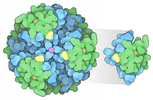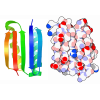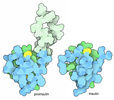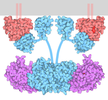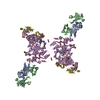[English] 日本語
 Yorodumi
Yorodumi- PDB-6hn4: Leucine-zippered human insulin receptor ectodomain with single bo... -
+ Open data
Open data
- Basic information
Basic information
| Entry | Database: PDB / ID: 6hn4 | |||||||||||||||
|---|---|---|---|---|---|---|---|---|---|---|---|---|---|---|---|---|
| Title | Leucine-zippered human insulin receptor ectodomain with single bound insulin - "lower" membrane-proximal part | |||||||||||||||
 Components Components | Insulin receptor,Insulin receptor,General control protein GCN4 | |||||||||||||||
 Keywords Keywords | SIGNALING PROTEIN / insulin / insulin receptor ectodomain / signal transdution | |||||||||||||||
| Function / homology |  Function and homology information Function and homology informationFCERI mediated MAPK activation / protein localization to nuclear periphery / regulation of female gonad development / Activation of the AP-1 family of transcription factors / positive regulation of meiotic cell cycle / response to amino acid starvation / negative regulation of ribosomal protein gene transcription by RNA polymerase II / positive regulation of cellular response to amino acid starvation / mediator complex binding / insulin-like growth factor II binding ...FCERI mediated MAPK activation / protein localization to nuclear periphery / regulation of female gonad development / Activation of the AP-1 family of transcription factors / positive regulation of meiotic cell cycle / response to amino acid starvation / negative regulation of ribosomal protein gene transcription by RNA polymerase II / positive regulation of cellular response to amino acid starvation / mediator complex binding / insulin-like growth factor II binding / positive regulation of developmental growth / male sex determination / insulin receptor complex / positive regulation of protein-containing complex disassembly / insulin-like growth factor I binding / insulin receptor activity / Oxidative Stress Induced Senescence / exocrine pancreas development / dendritic spine maintenance / cargo receptor activity / insulin binding / adrenal gland development / PTB domain binding / neuronal cell body membrane / Signaling by Insulin receptor / IRS activation / positive regulation of respiratory burst / amyloid-beta clearance / TFIID-class transcription factor complex binding / amino acid biosynthetic process / regulation of embryonic development / positive regulation of receptor internalization / insulin receptor substrate binding / positive regulation of RNA polymerase II transcription preinitiation complex assembly / epidermis development / positive regulation of glycogen biosynthetic process / protein kinase activator activity / Signal attenuation / positive regulation of transcription initiation by RNA polymerase II / cellular response to nutrient levels / heart morphogenesis / transport across blood-brain barrier / phosphatidylinositol 3-kinase binding / Insulin receptor recycling / insulin-like growth factor receptor binding / dendrite membrane / neuron projection maintenance / positive regulation of mitotic nuclear division / receptor-mediated endocytosis / Insulin receptor signalling cascade / cellular response to amino acid starvation / positive regulation of glycolytic process / positive regulation of D-glucose import across plasma membrane / learning / receptor protein-tyrosine kinase / caveola / receptor internalization / cellular response to growth factor stimulus / RNA polymerase II transcription regulator complex / male gonad development / memory / cellular response to insulin stimulus / positive regulation of nitric oxide biosynthetic process / insulin receptor signaling pathway / late endosome / glucose homeostasis / amyloid-beta binding / protein autophosphorylation / PI5P, PP2A and IER3 Regulate PI3K/AKT Signaling / DNA-binding transcription activator activity, RNA polymerase II-specific / protein tyrosine kinase activity / transcription regulator complex / sequence-specific DNA binding / RNA polymerase II-specific DNA-binding transcription factor binding / DNA-binding transcription factor activity, RNA polymerase II-specific / lysosome / positive regulation of phosphatidylinositol 3-kinase/protein kinase B signal transduction / positive regulation of canonical NF-kappaB signal transduction / receptor complex / positive regulation of MAPK cascade / endosome membrane / intracellular signal transduction / positive regulation of cell migration / RNA polymerase II cis-regulatory region sequence-specific DNA binding / G protein-coupled receptor signaling pathway / DNA-binding transcription factor activity / protein domain specific binding / axon / external side of plasma membrane / positive regulation of cell population proliferation / chromatin binding / regulation of DNA-templated transcription / symbiont entry into host cell / positive regulation of DNA-templated transcription / GTP binding / protein-containing complex binding / negative regulation of transcription by RNA polymerase II / positive regulation of transcription by RNA polymerase II / extracellular exosome / ATP binding Similarity search - Function | |||||||||||||||
| Biological species |  Homo sapiens (human) Homo sapiens (human) | |||||||||||||||
| Method | ELECTRON MICROSCOPY / single particle reconstruction / cryo EM / Resolution: 4.2 Å | |||||||||||||||
 Authors Authors | Weis, F. / Menting, J.G. / Margetts, M.B. / Chan, S.J. / Xu, Y. / Tennagels, N. / Wohlfart, P. / Langer, T. / Mueller, C.W. / Dreyer, M.K. / Lawrence, M.C. | |||||||||||||||
| Funding support |  Australia, Australia,  United States, 4items United States, 4items
| |||||||||||||||
 Citation Citation |  Journal: Nat Commun / Year: 2018 Journal: Nat Commun / Year: 2018Title: The signalling conformation of the insulin receptor ectodomain. Authors: Felix Weis / John G Menting / Mai B Margetts / Shu Jin Chan / Yibin Xu / Norbert Tennagels / Paulus Wohlfart / Thomas Langer / Christoph W Müller / Matthias K Dreyer / Michael C Lawrence /    Abstract: Understanding the structural biology of the insulin receptor and how it signals is of key importance in the development of insulin analogs to treat diabetes. We report here a cryo-electron microscopy ...Understanding the structural biology of the insulin receptor and how it signals is of key importance in the development of insulin analogs to treat diabetes. We report here a cryo-electron microscopy structure of a single insulin bound to a physiologically relevant, high-affinity version of the receptor ectodomain, the latter generated through attachment of C-terminal leucine zipper elements to overcome the conformational flexibility associated with ectodomain truncation. The resolution of the cryo-electron microscopy maps is 3.2 Å in the insulin-binding region and 4.2 Å in the membrane-proximal region. The structure reveals how the membrane proximal domains of the receptor come together to effect signalling and how insulin's negative cooperativity of binding likely arises. Our structure further provides insight into the high affinity of certain super-mitogenic insulins. Together, these findings provide a new platform for insulin analog investigation and design. | |||||||||||||||
| History |
|
- Structure visualization
Structure visualization
| Movie |
 Movie viewer Movie viewer |
|---|---|
| Structure viewer | Molecule:  Molmil Molmil Jmol/JSmol Jmol/JSmol |
- Downloads & links
Downloads & links
- Download
Download
| PDBx/mmCIF format |  6hn4.cif.gz 6hn4.cif.gz | 161.6 KB | Display |  PDBx/mmCIF format PDBx/mmCIF format |
|---|---|---|---|---|
| PDB format |  pdb6hn4.ent.gz pdb6hn4.ent.gz | 114.2 KB | Display |  PDB format PDB format |
| PDBx/mmJSON format |  6hn4.json.gz 6hn4.json.gz | Tree view |  PDBx/mmJSON format PDBx/mmJSON format | |
| Others |  Other downloads Other downloads |
-Validation report
| Arichive directory |  https://data.pdbj.org/pub/pdb/validation_reports/hn/6hn4 https://data.pdbj.org/pub/pdb/validation_reports/hn/6hn4 ftp://data.pdbj.org/pub/pdb/validation_reports/hn/6hn4 ftp://data.pdbj.org/pub/pdb/validation_reports/hn/6hn4 | HTTPS FTP |
|---|
-Related structure data
| Related structure data |  0246MC  0247C  6hn5C M: map data used to model this data C: citing same article ( |
|---|---|
| Similar structure data |
- Links
Links
- Assembly
Assembly
| Deposited unit | 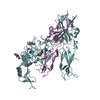
|
|---|---|
| 1 |
|
- Components
Components
| #1: Protein | Mass: 106728.211 Da / Num. of mol.: 2 Source method: isolated from a genetically manipulated source Source: (gene. exp.)  Homo sapiens (human), (gene. exp.) Homo sapiens (human), (gene. exp.)  Gene: INSR, GCN4, AAS3, ARG9, YEL009C / Plasmid: pEE14 / Strain: ATCC 204508 / S288c / Cell line (production host): Lec8 / Production host:  References: UniProt: P06213, UniProt: P03069, receptor protein-tyrosine kinase #2: Sugar | ChemComp-NAG / Has protein modification | Y | |
|---|
-Experimental details
-Experiment
| Experiment | Method: ELECTRON MICROSCOPY |
|---|---|
| EM experiment | Aggregation state: PARTICLE / 3D reconstruction method: single particle reconstruction |
- Sample preparation
Sample preparation
| Component | Name: Leucine zippered human insulin receptor ectodomain (IR-A isoform, "deltabeta" mutant) in complex with insulin and two Fv 83-7 modules : "lower" membrane-proximal part Type: COMPLEX Details: Note: Attached to the leucine-zippered insulin receptor ectodomain are two Fv 83-7 modules. One of these is present within this map volume but it is very poorly ordered and thus left ...Details: Note: Attached to the leucine-zippered insulin receptor ectodomain are two Fv 83-7 modules. One of these is present within this map volume but it is very poorly ordered and thus left completely unmodelled. See the manuscript for further details. Entity ID: #1 / Source: RECOMBINANT | |||||||||||||||
|---|---|---|---|---|---|---|---|---|---|---|---|---|---|---|---|---|
| Molecular weight | Units: MEGADALTONS / Experimental value: NO | |||||||||||||||
| Source (natural) | Organism:  Homo sapiens (human) Homo sapiens (human) | |||||||||||||||
| Source (recombinant) | Organism:  | |||||||||||||||
| Buffer solution | pH: 7.5 | |||||||||||||||
| Buffer component |
| |||||||||||||||
| Specimen | Conc.: 0.094 mg/ml / Embedding applied: NO / Shadowing applied: NO / Staining applied: NO / Vitrification applied: YES | |||||||||||||||
| Vitrification | Instrument: FEI VITROBOT MARK IV / Cryogen name: ETHANE / Humidity: 100 % / Chamber temperature: 283.15 K |
- Electron microscopy imaging
Electron microscopy imaging
| Experimental equipment |  Model: Titan Krios / Image courtesy: FEI Company |
|---|---|
| Microscopy | Model: FEI TITAN KRIOS |
| Electron gun | Electron source:  FIELD EMISSION GUN / Accelerating voltage: 300 kV / Illumination mode: FLOOD BEAM FIELD EMISSION GUN / Accelerating voltage: 300 kV / Illumination mode: FLOOD BEAM |
| Electron lens | Mode: BRIGHT FIELD / Nominal magnification: 130000 X / Nominal defocus max: 2500 nm / Nominal defocus min: 1000 nm / Cs: 2.7 mm / C2 aperture diameter: 50 µm / Alignment procedure: COMA FREE |
| Specimen holder | Cryogen: NITROGEN / Specimen holder model: FEI TITAN KRIOS AUTOGRID HOLDER |
| Image recording | Average exposure time: 16 sec. / Electron dose: 1.85 e/Å2 / Detector mode: SUPER-RESOLUTION / Film or detector model: GATAN K2 SUMMIT (4k x 4k) / Num. of grids imaged: 1 / Num. of real images: 2287 |
| EM imaging optics | Energyfilter name: GIF Quantum LS / Energyfilter slit width: 20 eV |
| Image scans | Movie frames/image: 20 / Used frames/image: 1-20 |
- Processing
Processing
| Software | Name: PHENIX / Version: 1.13-2998_1692: / Classification: refinement | ||||||||||||||||||||||||||||||||||||||||||||
|---|---|---|---|---|---|---|---|---|---|---|---|---|---|---|---|---|---|---|---|---|---|---|---|---|---|---|---|---|---|---|---|---|---|---|---|---|---|---|---|---|---|---|---|---|---|
| EM software |
| ||||||||||||||||||||||||||||||||||||||||||||
| CTF correction | Type: PHASE FLIPPING AND AMPLITUDE CORRECTION | ||||||||||||||||||||||||||||||||||||||||||||
| Particle selection | Num. of particles selected: 747074 | ||||||||||||||||||||||||||||||||||||||||||||
| Symmetry | Point symmetry: C1 (asymmetric) | ||||||||||||||||||||||||||||||||||||||||||||
| 3D reconstruction | Resolution: 4.2 Å / Resolution method: FSC 0.143 CUT-OFF / Num. of particles: 98481 / Algorithm: BACK PROJECTION / Num. of class averages: 2 / Symmetry type: POINT | ||||||||||||||||||||||||||||||||||||||||||||
| Atomic model building | Protocol: OTHER / Space: REAL / Target criteria: Cross-correlation coefficient | ||||||||||||||||||||||||||||||||||||||||||||
| Atomic model building | PDB-ID: 4ZXB Accession code: 4ZXB / Source name: PDB / Type: experimental model |
 Movie
Movie Controller
Controller


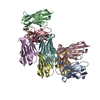
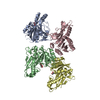
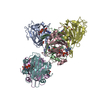
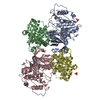
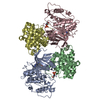
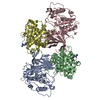
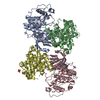
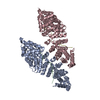
 PDBj
PDBj
